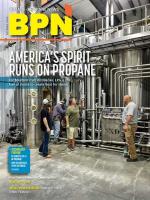
Artificial intelligence (AI) has rapidly become a transformative force across various industries, from health care to finance and transportation. In this article, we will demystify the concept of AI and explore its potential impact on the propane industry.
As we journey through this exciting intersection of technology and energy, you’ll discover how AI can enhance efficiency, safety and sustainability in the propane sector. Before diving into the propane industry’s future, let’s lay the foundation by understanding what AI is and how it works.
Basics of AI
At its core, AI is the development of computer systems to perform tasks that typically require human intelligence. These tasks include recognizing patterns, making decisions, understanding natural language and learning from experience. AI systems are designed to process vast amounts of data and use it to make informed decisions. Machine learning is a crucial subset of AI that enables computers to learn from data and improve their performance over time. Here’s a simplified breakdown:
- Data collection — To train an AI model, you start by collecting large datasets relevant to the task at hand. For example, in the propane industry, this could be data on propane consumption, weather patterns and equipment maintenance records.
- Training — The AI model uses this data to identify patterns and relationships. For instance, it might learn that propane consumption tends to increase during colder months.
- Testing — After training, the model is tested on new, unseen data to evaluate its accuracy. It keeps improving as it encounters more data, becoming better at making predictions or decisions.
- Application — Once trained, AI models can be used to optimize various aspects of a business, such as predicting propane demand, scheduling deliveries or optimizing routes for propane delivery trucks.
Now that we have grasped the basics of AI, let’s explore how these innovations translate into real-world benefits and address the challenges faced in the propane industry.
1. Workforce Collaboration: Humans & AI Working Together
It’s essential to emphasize that AI is here to enhance the capabilities of human workers. By automating repetitive and data-intensive tasks, AI allows employees to focus on more strategic and creative aspects of their roles. Propane industry professionals can work collaboratively with AI systems, leveraging their analytical prowess and data-driven insights to make more informed decisions.
2. Predictive Maintenance: A Proactive Approach
Imagine a scenario where propane suppliers can anticipate equipment failures before they happen. By deploying sensors and AI algorithms to monitor the condition of storage tanks, regulators and delivery trucks, propane companies can implement predictive maintenance strategies. When anomalies or potential issues are detected, maintenance teams can be dispatched promptly, preventing costly breakdowns and ensuring the reliability of propane deliveries.
3. Optimized Demand Forecasting: Meeting Customer Needs Efficiently
Accurate demand forecasting is crucial for propane suppliers. By analyzing historical consumption data, customer behavior and external factors like weather patterns, AI systems can generate more precise predictions. This enables propane companies to optimize their inventory management and delivery schedules, ensuring that customers receive propane when they need it, reducing the risk of running out and minimizing unnecessary deliveries that drive up costs and emissions.
4. Route Optimization: Efficiency on the Road
Propane delivery trucks crisscross vast geographical areas, often navigating challenging terrains and weather conditions. AI-powered route optimization systems can dynamically adjust delivery routes in real-time based on traffic conditions, weather updates and delivery priorities. This not only reduces fuel consumption and vehicle wear and tear, but also ensures timely deliveries, enhancing customer satisfaction.
5. Safety First: AI for Propane Tank Monitoring
Propane storage tanks are critical components of the industry, but they can pose safety risks if not properly maintained. AI systems equipped with sensors can continuously monitor the integrity of these tanks. Any abnormalities or gas leaks can trigger immediate alerts to operators, enabling rapid response and minimizing the potential for accidents. By enhancing safety measures, AI contributes to a safer working environment and the protection of communities surrounding propane facilities.
6. Environmental Impact Reduction: A Green Perspective
Propane is often considered a cleaner-burning fuel, but there’s always room for improvement in minimizing its environmental footprint. AI-driven insights can identify opportunities to reduce emissions and energy consumption within the propane industry. For example, by optimizing delivery routes to minimize mileage, propane companies can cut down on fuel consumption, reducing greenhouse gas emissions. Additionally, AI can help identify alternative, more sustainable energy sources for powering equipment and facilities, further contributing to environmental sustainability.
7. Customer Service Revolution: The AI Chatbot
In today’s fast-paced world, customers expect efficient and timely service. AI-powered chatbots and virtual assistants can handle routine customer inquiries, provide billing information, schedule deliveries and offer general propane-related assistance. As AI technology continues to advance, we can expect even more sophisticated and effective chatbot solutions in the future. This not only improves customer satisfaction by providing 24/7 support but also frees up human resources to focus on more complex tasks and personalized customer interactions.
8. Data-Driven Decision-Making: Unlocking Propane Industry Potential
AI’s ability to process vast amounts of data enables propane companies to make informed decisions and refine their operations continually. Whether it’s analyzing market trends, optimizing pricing strategies or identifying cost-saving opportunities, AI empowers propane businesses to stay competitive and resilient in a rapidly evolving energy landscape.
9. Regulatory Compliance & Safety
Safety is paramount in the propane industry, and AI can play a pivotal role in ensuring regulatory compliance. By automating safety checks, monitoring for potential hazards and facilitating immediate responses to emergencies, AI contributes to the industry’s adherence to stringent safety standards.
10. The Future of Sustainable Energy
As the world continues to prioritize sustainability and reduced carbon emissions, the propane industry has an opportunity to position itself as a clean and efficient energy source. AI’s role in optimizing operations, reducing waste and minimizing environmental impact aligns seamlessly with these goals, making propane a compelling choice for those seeking cleaner energy options.
A Bright Future for Propane & AI
The propane industry is on the brink of a transformative journey with AI. The convergence of AI and the propane sector presents a wealth of opportunities. By harnessing the power of AI to optimize operations, enhance safety, reduce environmental impact and improve customer service, the propane industry can adapt and thrive in an ever-changing energy landscape.
Propane suppliers that embrace AI technologies will be better equipped to meet customer needs, cut costs and contribute to a more sustainable energy future for us all. As AI continues to evolve, the propane industry’s transformation will undoubtedly continue to accelerate, benefiting both businesses and the communities they serve.


